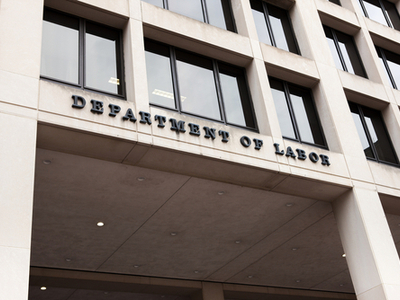Lockheed Martin V Administrative Review Board Case Brief
ARB
DOL Issues New Rules to Try to Vanquish the Clock

In a possible attempt to implement new rules before they can be rescinded by a Autonomous Congress and administration, the Department of Labor recently finalized regulations regarding wage and hour issues and the Labor Secretary'due south ability to review authoritative decisions. These administrative moves are the consequence of a petty-known but of import statute aimed at curbing midnight rulemaking by approachable administrations. The Congressional Review Deed ("CRA") establishes special congressional procedures for disapproving a broad range of regulatory rules issued by federal agencies. Past joint resolution, Congress tin can corroborate or disapprove of a regulation, which and so goes to the President to sign or veto. If Congress adjourns its annual session less than 60 "legislative days" in the House of Representatives or lx "session days" in the Senate after a rule is submitted to it, the rule is carried over to the next session of Congress and subject to possible disapproval during that session. While it is difficult to calculate the CRA deadline—particularly given COVID-19'south impact on Congress' schedule—if the Trump administration fails to finalize the rules earlier the CRA deadline and Republicans lose control of the White Business firm and Senate, a Democratic-controlled Congress could successfully rescind the rules nether the CRA. READ More
Non So Fast: Authoritative Review Board Vacates Discrimination Finding Sought past OFCCP

A contempo conclusion from the Department of Labor's Administrative Review Board serves every bit a warning to federal agencies against overreaching in their efforts to identify alleged employment bigotry. Information technology also serves to highlight the heavy brunt that plaintiffs—whether government agencies or private litigants—must carry in cases alleging a pattern or practise of disparate treatment.
READ More
Bonus Points: ARB Upholds Whistleblower Order Challenging Bonus Plan

The Department of Labor's Administrative Review Lath ("ARB") recently upheld an order finding a semiconductor company had constructively discharged a manager who complained the company's bonus plan violated state wage and hour laws, and in doing so, broadly interpreted the protections offered under the Sarbanes-Oxley Act ("SOX" or "Deed").
READ More
Second Excursion Rejects Definitively and Specifically Standard Only Upholds Dismissal of SOX Whistleblower Complaint in Nielsen 5. AECOM

Terminal week, the Second Circuit upheld a district court'south dismissal of a plaintiff's Sarbanes-Oxley ("SOX") whistleblower claim – merely non earlier rejecting the "definitively and specifically" standard on which the district court'south decision relied. Nielsen v. AECOM Tech. Corp., No. 13-235-cv (2d Cir. Aug. 8, 2014).
READ More
Babysitters at the Gate: The Supreme Court's Radical Expansion of SOX'southward Whistleblower Protections

Yesterday, in Lawson five. FMR LLC, a divided U.S. Supreme Court decided its first case addressing the whistleblower protections of the Sarbanes-Oxley Act (SOX). The question earlier the Court: do those protections extend only to the employees of public companies, or do they also accomplish the employees of contractors and subcontractors of public companies? You can come across our prior posts on the case here (June nineteen, 2012), here (Oct 8, 2013), hither (January 7, 2014), and here (January 28, 2014). READ MORE
SOX Gone Wild: Misappropriation and Transmission of Confidential Company/Employee Data to the Government Protected nether SOX

A whistleblower who took sensitive company information from his employer and turned information technology over to the IRS has won his retaliation claim at the Section of Labor under the Sarbanes-Oxley Deed'south ("SOX") whistleblower protection provisions. In Vannoy five. Celanese Corp., ALJ Case No. 2008-SOX-00064, ARB Instance No. 09-118 (ALJ July 24, 2013), an Authoritative Law Judge was presented with the question of whether Vannoy's removal of highly sensitive company data and transmission of that data to the IRS constituted protected activeness under SOX. Vannoy, who was formerly employed as the administrator of Celanese's corporate credit card program, first allegedly complained internally that the company "misstated their fiscal records and underestimated their required tax brunt potentially in millions." Vannoy sought legal counsel and eventually reported the company's declared accounting misconduct to the IRS. READ More
Tenth Circuit Issues its First Conclusion Interpreting SOX: Offers Broad Reading of the Act

On Tuesday, June 4thursday, the Tenth Circuit Court of Appeals issued its first decision interpreting the Sarbanes Oxley Act's whistleblower protection provision, affirming a decision by the U.Due south. Department of Labor's Administrative Review Lath ("ARB"), which held that Lockheed Martin violated SOX by constructively discharging employee Andrea Brown after she had engaged in protected activeness. The court applied Chevron deference to the ARB'south employee-friendly interpretations of SOX's requirements. READ More than
ARB Holds Private Firm Accountants Are Covered By SOX

In Spinner 5. David Landau and Associates, LLC, the Section of Labor's Administrative Review Board ("ARB") held that an accountant for a private house was a covered employee under SOX where the firm performed services for publicly traded clients. In then belongings, the ARB rejected the First Circuit's contrary interpretation of SOX in Lawson v. FMR LLC. The Spinner decision provides new ammunition for employees of non-public companies seeking to bring SOX whistleblower claims against their firms and raises significant liability concerns for firms that have operated under the supposition that their employees were not covered by SOX's whistleblower provisions. READ MORE
Department of Labor Rejects Title VII Framework in SOX Whistleblower Cases

A new opinion from the Department of Labor ("DOL") makes articulate that the department will treat the burden of proof in whistleblower retaliation claims under the Sarbanes-Oxley Human activity ("SOX") differently from typical retaliation claims under Championship VII. In an stance issued in late March – Zinn v. American Commercial Lines Inc. – the DOL's Administrative Review Board ("ARB") reversed an administrative law judge'due south determination that practical Championship VII's "burden shifting" framework to dismiss Zinn'due south whistleblower retaliation claim. Specifically, the ARB removed the third prong of the traditional "brunt shifting" assay equally discussed farther below.
Under Championship VII, once an employee makes a prima facie instance of retaliation, the burden shifts to the employer to provide a legitimate not-retaliatory reason for taking the adverse employment action at issue in the case. If an employer provides such a reason, the burden then shifts back to the employee to show that the employer'south reasons were actually a pretext for retaliation. In Zinn, the ARB plant it was incorrect to utilise this framework and "conflat[e] the SOX brunt of proof standard with the Title Vii burden of proof." Under SOX, the employee needs to prove that she engaged in protected activity that contributed to an adverse employment activity. The burden then shifts to the employer to demonstrate, by clear and convincing bear witness, that it would have taken the same adverse action absent-minded the protected activity. Withal, the ARB antiseptic that it was unnecessary for the employee to then show that the employer's deportment were pretextual. Instead, one time an employer produces evidence to support that its deportment were non-retaliatory, an authoritative law approximate should "counterbalance the circumstantial evidence as a whole" to "judge the context of the adverse activity in question" and determine whether the case should go along. With this singled-out standard and its rejection of the familiar Title VII framework, the DOL has fabricated information technology evident that SOX whistleblower cases will go on to be a unique and developing area of employment law.
piercesagifen1964.blogspot.com
Source: https://blogs.orrick.com/employment/tag/arb/
0 Response to "Lockheed Martin V Administrative Review Board Case Brief"
Post a Comment